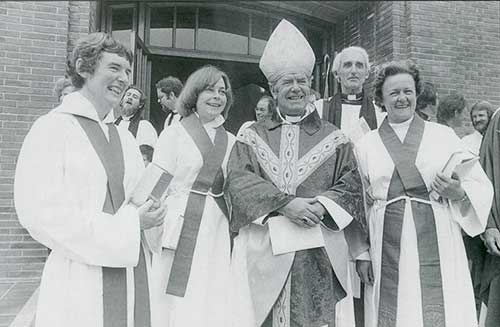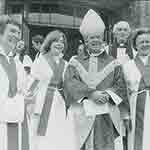
On 3 December 1977, three women were ordained to the priesthood: Rev. Jean Brookes, Rev. Wendy Cranston, and Rev. Heather Brunton. They were the first women to be ordained priests in New Zealand. This was the fourth Anglican province to allow women to be ordained to the priesthood.
This year, Sunday 3 December is hence the 40th anniversary of this event. There is a good summary on Anglican Taonga.
Significantly, there has been no significant controversy around the ordination of women in this province – no flying bishops or calls for alternative episcopal oversight, etc. If anything, the growing influence of Sydney-like Anglicanism here might mean that is yet to come.
A commemorative liturgy of the Eucharist has been prepared by Archdeacon of Auckland Carole Hughes and a group of advisers. The suggestion is that you can draw resources from it, especially the collect:
God who has created us in your image,
as we remember 40 years of the ordained ministry of women in these lands
may the gift of memory become our treasure,
may our present time celebrate prophetic voices
that we may offer vision and hope for the future.
Through Christ Jesus,
who is alive with you and the Holy Spirit,
one God, now and for ever. Amen.
And the Hymn written specially for this occasion:
Praise God for faithful women
Tune: Thaxted (I vow to thee my country)Praise God for faithful women
who, from the Gospel’s birth,
have lived their lives for Jesus
in every land on earth
by leadership and teaching,
with work of loving care,
as visionaries and mystics
in solitude and prayer.
They stand throughout our history
as signs of hope and grace,
revealing Jesus’ presence
within their time and place.Give thanks for their persistence
in claiming Jesus’ call
to be what he has made them,
whose church includes us all:
to serve as priests and leaders,
stand at their brothers’ side,
enriching Jesus’ people
with gifts too long denied.
Old barriers have fallen;
the Gospel sets us free
to follow where God leads us
in true equality.So we, who walk together
into the coming day,
give thanks for faithful women,
who join us as we pray
to share with those we care for
the truth we have believed,
and bear into the future
the light we have received.
With called and chosen women
who lead us in God’s ways,
we bring our dedication,
our offering of praise.
by Marnie Barrell, 2017
Clarification: For some readers here, the mention of a “liturgist” leading the service will be confusing. It is not used to mean, as most use it, a scholar in liturgics. Some NZ Anglicans use “liturgist” to refer to a co-presider, usually a lay person, at a Eucharist. Although there is no change to another leader indicated [until the Blessing of Priests], one presumes that a priest or bishop is understood to take on the normal roles of absolution, leading the Eucharistic Prayer, and so on.
If you appreciated this post, do remember to like the liturgy facebook page, use the RSS feed, and sign up for a not-very-often email, …




What a wonderful photo and liturgy celebrating the ordination of women priests.
Nice to see my friend Jean Brookes there, who was one of the first Anglican deaconesses, later deacon. Is that Andrew Beyer in the background, whom I worked with in the movement against the 1981 Springbok tour ?
It is good to see the Church able to change, although in this case perhaps the change is merely back to the original practice of the early Church ?
Many blessings and thanks for a post which gives me hope.
As a musician I am always interested in the choice of song! Jupiter, the boldest, strongest, strangest planet, stained red from ‘unknown contaminants’….
I stopped being a Catholic in my heart as a very young child- they told me I couldn’t become a Pope!
I never waste my time on human endeavors where human achievement is blocked.
When the Catholic Church grows up I’ll be back there.
IMHO, ordaining a woman is the same as denying the faith that the apostles taught in the scriptures. There were no women among the apostles. Paul taught in 1 Corinthians 14 that women should be silent, a command which he applied to all churches. He wrote to Timothy in his first epistle to him that women should be silent, not because of their culture but because of their nature as daughters of Eve. So, to recap: Orthodoxy rejects women in leadership over men in all churches for all time.
Thanks, Jack. In the light of your final sentence, the “H” in your “IMHO” must be ironic.
A brief comment by me here is hardly the place for deep theological analysis of the two biblical texts you point to. Suffice to say, there’s plenty available if you are genuinely interested in such a discussion.
Because 1 Corinthians is responding to material Paul received, and without Greek having the convention of quotation marks, we can no longer tell when Paul is quoting what the Corinthians say and when he is making his own teaching. 1 Corinthians 14:34-35, the suggestion that women should keep quiet, may be what the Corinthians taught and Paul looks to be following this with his own shock at the suggestion! He continues, in 1 Corinthians 14.36-40, to castigate such a suggestion: What?! Did the message originate with you men?! Or are you men the only ones it has reached?! So, my friends, be eager to prophesy, and do not forbid speaking in tongues; but all things should be done decently and in order.
Remember the Good News of Christ’s resurrection originates with women, especially Mary Magdalene, the apostle to the apostles (let alone interpretations of Paul’s greeting of Junia, “prominent among the apostles”).
1 Corinthians 11 would argue against your interpretation of 1 Corinthians 14, as there St Paul clearly allows women to pray and prophesy in church if they had the appropriate attire.
I hope that helps to give you a taster for your further research on this topic.
Blessings.
Hi Jack and Bosco
1 Corinthians 11:2-16 is critical (IMHO!) because it reveals a Paul who shifts in the course of a few verses from an argument about women and their place in hierarchy to women and men engaging in life in mutuality (all the while, by the way, with women able to speak in church, contrary to 1 Corinthians 14:33-36 and 1 Timothy 2:11 (if not also 2:12-15).
Whether 1 Cor 14:33-36 is a response to a Corinthian statement/question as Bosco supposes here, or is an interpolated text from a later hand (which many but not all commentators support), it is hard to reconcile these verses as supporting a prohibition on women speaking in church when Paul has assumed they can in the earlier chapter.
1 Timothy 2:11-16, whether from Paul or (as most modern commentators argue) a disciple of Paul, then seems drawn to the first, hierarchical part of 1 Corinthians 11 at the expense of the later mutuality part.
Clearly some significant groups of Christians (e.g. Orthodox and some conservative evangelicals) take 1 Timothy 2:11-15 at face value, in conjunction with 1 Corinthians 14:33-36, and prohibit women speaking in church. Such a reading is possible and plausible but it is not the only reading because the whole “Pauline” testament (including references to Priscilla and Aqula, to Phobe and so forth) presents a tension within Pauline Christianity between tendencies to permit women speaking in church and tendencies to prohibit women speaking in church.
How might we resolve the tension?
One possibility is to allow Galatians 3:28 to guide us.
Another I am working on is to appeal to Jesus and his handling of prescriptive law which got in the way of human vitality – a so-called hermeneutic of mercy – when Jesus determined that Sabbath laws should not get in the way of feeding his disciples nor in the way of healing people.
Incidentally when you (Jack) are talking about the nature of women as daughters of Eve, let’s be clear about what you mean via 1 Timothy 2:13-14: every women is gullible. Is that your view of women? It is not mine.
Thanks so much, Peter, for this helpful biblical exploration. Blessings.
There was some scholarship a few years ago naming Priscilla as author of Epistle to the Hebrews.
Yes, Tracy – there’s theories that Genesis was written by a woman, and that the Fourth Gospel is based on Mary Magdalene – the disciple whom Jesus loved. Blessings.
A note on genre: the Pauline corpus are pastoral letters. They simply do not bind the Church day with the pastoral solutions their authors thought appropriate 2,000 years ago in a very different culture.
FWIW, the Catholic Church, which does not ordain women, is perfectly happy with women speaking in Church and teaching, which seems very consistent with the ancient Orthodox practice of women deacons. There are many female doctors of the Catholic Church, recognised for their excellence in teaching.
Any theology of women’s role in the Church would need to be consistent with the preeminent role of the mother of God. In Catholic theology, all graces, including those of ordination and the other sacraments flow through her as mediatrix of all graces. A woman is essential to the efficacy of the sacraments.
Many Blessings
Love it, Chris. Thanks! Blessings.
‘the preeminent role of the mother of God.’
In music, some of the most beautiful music written in the past century is about the Mother of God https://www.youtube.com/watch?v=HMC1A2Z3UKo